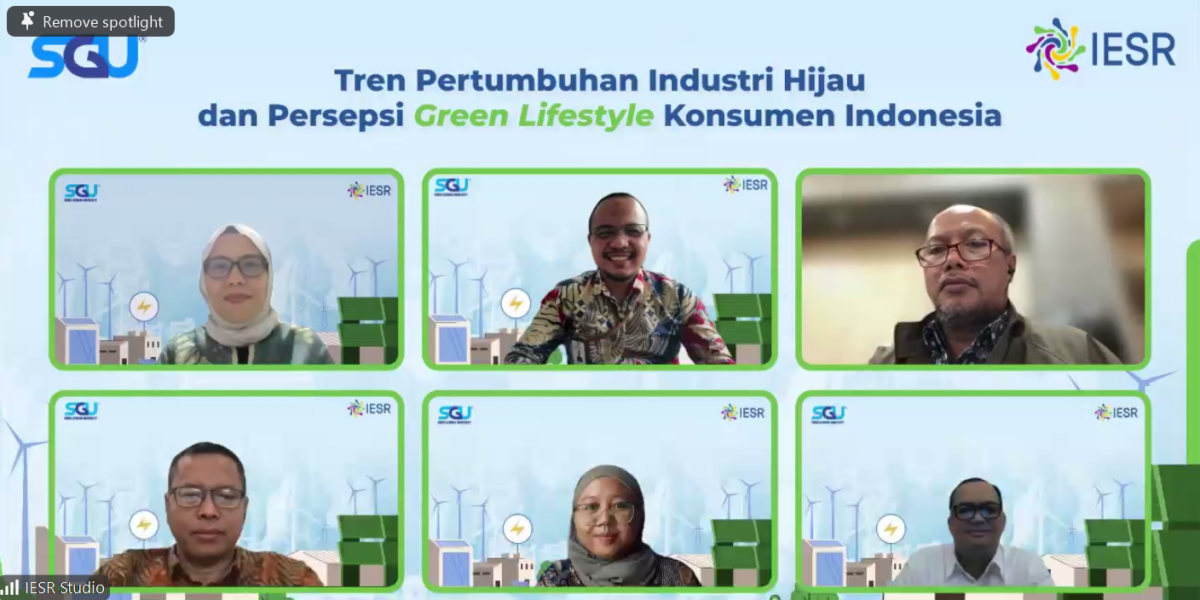Jakarta, November 15, 2024 – The global commitment to limit the Earth’s temperature rise to 1.5 degrees Celsius has driven the trend of energy transition and emission reduction activities in various sectors, including the industrial sector. The Institute for Essential Services Reform (IESR) encourages the government to implement a green industry system as a key strategy to maintain the competitiveness of Indonesia’s industry amid increasing sustainability standards in several regions. This step will also support Indonesia’s achievement of Net Zero Emission (NZE) by 2060 or earlier.
Juniko Nur Pratama, IESR’s Industrial Decarbonization Program Manager, said that the trend of global energy transition and Indonesia’s commitment to achieve NZE by 2060 or earlier has also brought changes to the increasing public awareness ofgreen and low-emission products and lifestyles. Therefore, he emphasized the importance of the industry to make efforts to reduce emissions or decarbonize to meet the needs of consumers who are increasingly concerned about environmental sustainability.
“The Indonesian government has established the concept of green industry, which in the production process prioritizes efforts to make efficient and effective use of resources in a sustainable manner. Along with the increasing global demand for sustainable products, industries that apply sustainability principles are able to answer market challenges while supporting national decarbonization targets,” Juniko said in the Webinar on Green Industry Growth Trends and Green LifestylePerceptions of Indonesian Consumers on Friday (15/11).
Faricha Hidayati, Coordinator of Industrial Decarbonization, IESR revealed that there are five pillars of decarbonization in the industrial sector, namely resource efficiency, energy efficiency, substitution of low-carbon fuels and materials and electrification with renewable energy, use of low-carbon technology, and utilization of carbon capture and storage technology, especially to reduce emissions fromhard to abate industries.
“Efforts to decarbonize the industrial sector can begin with resource efficiency and energy efficiency. However, the government also needs to encourage decarbonization of industrial heat, which is a significant contributor to emissions. One way is by shifting fossil-intensive energy sources to renewable energy,” Faricha explained.
IESR encourages the government and stakeholders to continue strengthening collaboration in green industry development. This includes developing policies that support the adoption of clean technologies, incentivizing green innovation, and raising public awareness about the importance of green lifestyles.
Andi Rizaldi, Head of the Industrial Services Standardization and Policy Agency, Ministry of Industry (Kemenperin) explained that his party encourages the green industry, among others, by implementing the Green Industry Certificate (SIH). As of November 13, 2024, the Ministry of Industry has issued 128 green industry certificates. Every company that has received SIH can use the Green Industry Logo on its product packaging. The Green Industry Logo is a form ofgreen labeling.
“Currently, companies and industries have considered the carbon footprint of the raw materials they use. This is in order to meet consumer demand for environmentally friendly products. The strategy taken by producers is to require sustainability performance such as through green certificates or the like to all suppliers,” said Andi.
He also added that green labeling can be a strategic tool to build consumer confidence in green products. Green labelling as agreen product marker not only increases product competitiveness in local and global markets, but also provides clear information to consumers that the product supports environmental sustainability efforts.
Tulus Abadi, Chairman of the Indonesian Consumers Foundation (YLKI) emphasized the importance of labeling carried out by certified institutions and has the authority to issue labeling permits, so that the public gets accurate information and there is no misinformation in accordance with the Consumer Protection Law.
“The application of labels is very important, but labels that are truly valid are certified by institutions that have competence. For example, if we buy rice with an organic label, the label must be issued by a trusted institution, not made by the producer himself. Such things are not fair and can be considered as deception,” he added.

